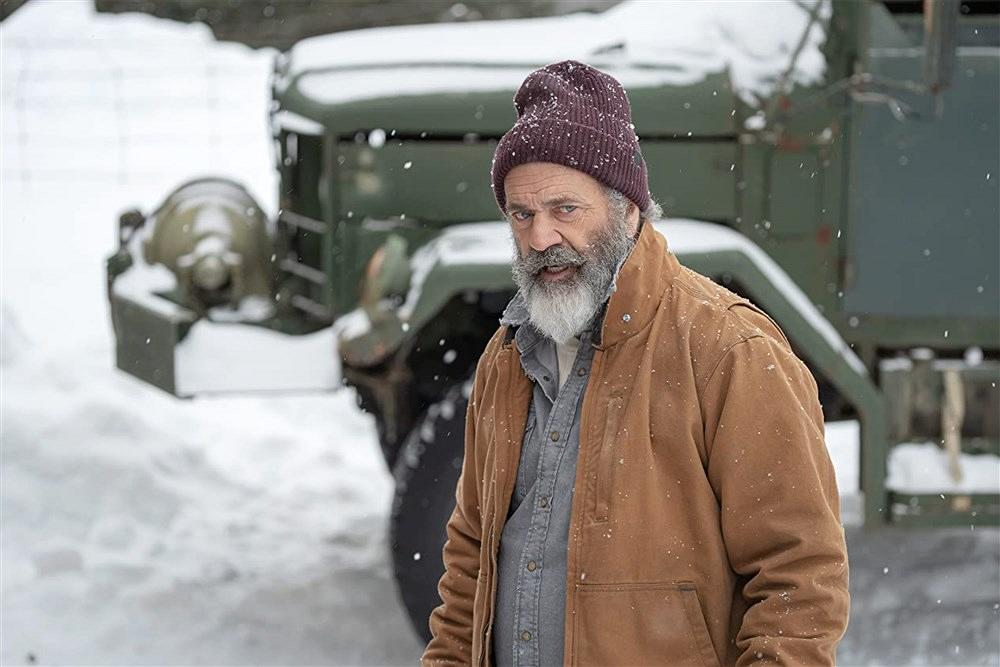Owner, Brown Dog Welding
- FMA
- The Fabricator
- FABTECH
- Canadian Metalworking
Categories
- Additive Manufacturing
- Aluminum Welding
- Arc Welding
- Assembly and Joining
- Automation and Robotics
- Bending and Forming
- Consumables
- Cutting and Weld Prep
- Electric Vehicles
- En Español
- Finishing
- Hydroforming
- Laser Cutting
- Laser Welding
- Machining
- Manufacturing Software
- Materials Handling
- Metals/Materials
- Oxyfuel Cutting
- Plasma Cutting
- Power Tools
- Punching and Other Holemaking
- Roll Forming
- Safety
- Sawing
- Shearing
- Shop Management
- Testing and Measuring
- Tube and Pipe Fabrication
- Tube and Pipe Production
- Waterjet Cutting
Industry Directory
Webcasts
Podcasts
FAB 40
Advertise
Subscribe
Account Login
Search
‘Fatman’: Dark comedy action Christmas movie meets contract fabrication
- By Josh Welton
- December 22, 2020

Surprisingly entertaining Christmas movie 'Fatman' features Mel Gibson as a gruff Santa Claus turned military contract fabricator in a dark comedy storyline packed with action. Saban Films
As the movie credits rolled, I grabbed my phone to tweet:
Just finished “Fatman” and pleased to announce that it is the new Best Christmas Movie of All Time. Funny like Elf, Darker than Bad Santa, and Chris Cringle Dies Harder than John McClane. Entire cast is brilliant. Cars are cool. Death count in John Wick territory. 5 thumbs up. pic.twitter.com/p9g8M6gju1
— Josh Welton (@BrownDogWelding) November 25, 2020
At its core “Fatman” is a battle between survival and remaining true to oneself. It’s about a loving relationship stressed by an economic downturn. It’s about a small manufacturer pivoting during said downturn. It’s about a minority group earning respect from outsiders while putting their high skill level into action in an effort to maintain their way of life. It’s about taking responsibility for your own actions, and the consequences of not doing so.
Mel Gibson’s Chris Cringle, aka Santa, aka the Fatman, is a grizzled hulk of a man whose epic beard, scarred body, and skills with a gun show that this dude has seen some shit. He, along with Mrs. Ruth Cringle (crushed by Marianne Jean-Baptiste), lives on a secluded farm in the remote Alaskan town of North Peak. He drives an old, beat-up red F100 pickup around town to pick up checks and containers of mail from children and to swing by the local dive bar for a drink, except for when he’s piloting a reindeer-powered sleigh on Christmas Eve.
His Deadpool-esque indestructible nature is hinted at early when, after getting blasted by a shotgun, he downplays it to his wife Ruth, saying, “I’m fine, it’ll heal in the usual way.” Ruth, who is often stress-crocheting or baking Christmas cookies, is clearly his bedrock.
In something of a parallel universe to our COVID-19-ravaged 2020, the Cringles are dealing with their own pandemic endemic to their industry: naughty kids. Chris is the owner/operator of a fabrication business that annually invents, develops, builds, and delivers toys for good children. The U.S. contracts Santa’s workshop to do so. But with more and more kids burning down houses, dropping bowling balls on cars from overpasses, and swindling their elders to finance other criminal enterprises, the number of stockings full of unprofitable coal on Christmas morning has skyrocketed.
Government suits find a loophole in their contract that ties the yearly subsidy payment to Santa to the number of good children he served. Chris is pissed. How are more naughty kids than ever before his fault? Still, he works old contacts and with other countries in an effort to make up for the shortfall. But most have already given up Santa’s high-quality American-made goods, all handcrafted by incredibly skilled elves, for cheap Chinese-made junk.
What follows is a power play by the U.S. government. They strongarm a reluctant Santa into becoming a Department of Defense contractor out of financial necessity. His state-of-the-art subterranean factory quickly morphs into a secured DoD facility, and the elves, who not only always have Santa’s back but also understand the dire financial survival mode he’s in, go to work building highly sophisticated control panels for the next great American fighter jet. They endure the new regulations like champs (e.g., biometric scans to enter and the removal of bells from their footwear) and quickly impress the military officials with their skill, dedication, work ethic, and logistical prowess.
The film moves at a swift clip while still taking the time to introduce to the audience captivating characters.
Jonathan Miller, or the Skinny Man, is a hamster-loving, fridge-raiding, highly effective assassin/fixer portrayed by national treasure Walton Goggins. A troubled kid who grew into a bad adult, Skinny Man is obsessed with Santa and collects vintage/authentic gifts made in the big guy’s workshop. One of the cool threads this movie tugs at is the idea that gifts from Santa propel kids toward their destiny, like a girl who gets a stethoscope then turns into a doctor and a young boy who receives a toy kitchen set then grows up to be a world-class chef.
In Skinny Man’s case, you’re left wondering what could have been, as he prominently displays the only gift he ever received from Santa, a small diecast police car. When I asked Ian Nelms, who along with his brother Eshom Nelms wrote and directed “Fatman,” about the badass black Plymouth Gran Fury that Skinny Man thunders through the film in, he responded:
“Skinny's car: It matches the toy cop car he cherishes and holds up at the end—same car—and the only thing he got from Chris, which means he should have been a cop, but his bad childhood and bad decisions led him down a very different path.”
Elf 7 is played pitch-perfect by Eric Woolfe. He’s the ageless, no-nonsense superintendent of the workshop, and his brave actions in the final conflict also kinda give a heads up to the importance of having safety protocols in the workplace for incidents like an active shooter on the grounds. Elf 7’s explanation for the benefits blue-collar elves enjoy from their superior sugar-heavy candy and cake diet also served as a kind of personal motivation and affirmation for me.
On the flip side, there’s a supremely unlikable brat named Billy, deftly given life by young actor Chance Hurstfield, who weaves his sordid schemes through the movie from start to finish. Ultimately, he proves to be the catalyst for the Cringles’ paradigm shift on how to proactively deal with the naughty kid pandemic.
Can the Clauses forge a way to make their workshop sustainable without the lucrative defense contracts, military projects that don’t exactly jive with their ethos?
Do they even survive the Skinny Man’s bloody rampage meant to destroy Santa Claus once and for all?
There’s only one way to find out!
“Fatman” is an original, thoroughly sussed-out, entertaining tour of Merry Mayhem. It’s the Christmas movie you watch after the kiddos hit the hay. ‘Tis the season to sharpen your knives, load your guns, strap on a bulletproof vest, and grab a few cookies to sit down and stream the latest, greatest holiday action/adventure flick.
subscribe now

The Fabricator is North America's leading magazine for the metal forming and fabricating industry. The magazine delivers the news, technical articles, and case histories that enable fabricators to do their jobs more efficiently. The Fabricator has served the industry since 1970.
start your free subscriptionAbout the Author

- Stay connected from anywhere

Easily access valuable industry resources now with full access to the digital edition of The Fabricator.

Easily access valuable industry resources now with full access to the digital edition of The Welder.

Easily access valuable industry resources now with full access to the digital edition of The Tube and Pipe Journal.
- Podcasting
- Podcast:
- The Fabricator Podcast
- Published:
- 04/16/2024
- Running Time:
- 63:29
In this episode of The Fabricator Podcast, Caleb Chamberlain, co-founder and CEO of OSH Cut, discusses his company’s...
- Trending Articles
Tips for creating sheet metal tubes with perforations

Supporting the metal fabricating industry through FMA

JM Steel triples capacity for solar energy projects at Pennsylvania facility

Are two heads better than one in fiber laser cutting?

Fabricating favorite childhood memories

- Industry Events
16th Annual Safety Conference
- April 30 - May 1, 2024
- Elgin,
Pipe and Tube Conference
- May 21 - 22, 2024
- Omaha, NE
World-Class Roll Forming Workshop
- June 5 - 6, 2024
- Louisville, KY
Advanced Laser Application Workshop
- June 25 - 27, 2024
- Novi, MI


























